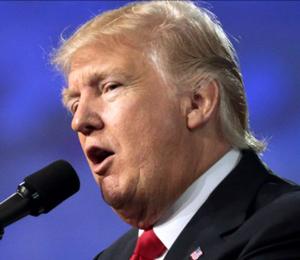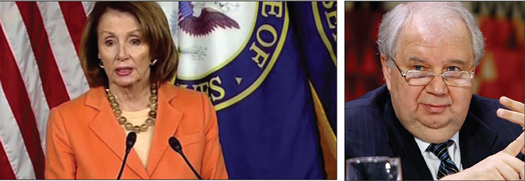'We are at a very dangerous moment'
By Askia Muhammad -Senior Editor- | Last updated: Mar 9, 2017 - 10:52:01 AMWhat's your opinion on this article?

President Donald Trump
|
In milder tones he called for “a new chapter of American greatness,” and he repeated his claim that he is “drain(ing) the swamp of government corruption.” He vowed to rebuild the armed forces, asking for an additional $54 billion for the Pentagon.
“Finally, to keep America safe, we must provide the men and women of the United States military with the tools they need to prevent war—if they must—they have to fight, and they only have to win. I am sending Congress a budget that rebuilds the military, eliminates the defense sequester and calls for one of the largest increases in national defense spending in American history,” Mr. Trump said.
Mr. Trump camouflaged some of his radical campaign promises, and he stuck to the teleprompter script. And as a result, he finally appeared to be “presidential” in the view of a vast majority of the public—82 percent of those who saw the Feb. 28 speech.

|
But then, in less than 24 hours, reports emerged about previously unknown meetings with the Russian ambassador to the U.S. with campaign surrogate and then Sen. Jeff Sessions (R-Ala.), who is now Attorney General caused Mr. Session to recuse himself from Justice Department investigations related to the 2016 presidential campaign, which would any Russian interference in the election process.
The situation spiraled downward, until Mr. Trump himself snatched defeat from the jaws of victory, angrily accusing former President Barack Obama of orchestrating a “Nixon/Watergate” plot to tap his phones in his Trump Tower headquarters in the weeks before the election.
“Obviously, we are at a very dangerous moment. Mr. Trump is erratic,” Dr. Gerald Horne, Moore’s Professor of History and African American Studies at the University of Houston, said in an interview.
“His policies are incoherent. What I mean is: he dispatches his Secretary of State and Defense and Homeland Security to Germany, and also Mr. Pence to deliver one message about the necessity of NATO—of course Mr. Trump had said that it’s obsolete—and that sends mixed messages, since there’s this theory that’s floating around, that with Brexit, there’s going to be a new so-called Anglo-American alliance that will seek to perhaps even destabilize the European Union, then Germany and France have to be defensive in terms of approaching that possible scenario,” Dr. Horne continued.
Mr. Trump’s good speech PR deteriorated when The Washington Post reported that Mr. Sessions twice met with Russian Ambassador Sergey Kislyak: in July on the sidelines of the Republican National Convention and in September in the senator’s office on Capitol Hill. The entire U.S. intelligence community agreed in a report that Russian operatives interfered with the election.
But during his confirmation hearing in January, then-Senator Sessions was asked by Minnesota Senator Al Franken whether he knew of contacts between Trump campaign officials and Russia’s government. “If there is any evidence that anyone affiliated with the Trump campaign communicated with the Russian government in the course of this campaign, what will you do?” Sen. Franken asked.

Nancy Pelosi, Minority Leader of the U.S. House of Representatives addresses the press about attorney general Jeff Sessions relations to Russia. Photos: MGN Online (L) Sergey Kislyak, Russian Ambassador to the United States.
|
“Senator Franken, I’m not aware of any of those activities. I have been called a surrogate at a time or two in that campaign, and I didn’t have—not have communications with the Russians,” then Sen. Sessions replied, although that answer appears now to be untrue.
House Minority Leader Nancy Pelosi accused Mr. Sessions of “apparent perjury” and said, “Sessions is not fit to serve as the top law enforcement officer of our country and must resign.” After the admission of the false statement calls increased for Mr. Sessions’ resignation; for a special prosecutor to investigate the charges; and at minimum for him to recuse himself.
Mr. Trump was reported infuriated by the recusal by Mr. Sessions, lashing out on Twitter at 6:35 a.m. the next morning, accusing Mr. Obama of meddling with the “very sacred election process.” “Bad (or sick) guy,” he said, offering no proof to substantiate his charges.
The Obama administration categorically denied the charges: “A cardinal rule of the Obama administration was that no White House official ever interfered with any independent investigation led by the Department of Justice. As part of that practice, neither President Obama nor any White House official ever ordered surveillance on any U.S. citizen. Any suggestion otherwise is simply false,” said Obama spokesman Kevin Lewis.
The director of national intelligence at the time of the U.S. election has denied there was any wire-tapping of Donald Trump or his campaign. James Clapper, who left office on Inauguration Day, also told NBC that he knew of no court order to allow monitoring of Trump Tower in New York.
In addition, the New York Times quoted senior officials as saying that FBI director James Comey had asked the Justice Department to publicly dismiss Mr. Trump’s allegation.
“Obviously, Mr. Trump has no impulse control,” said Dr. Horne concerning Mr. Trump’s frequent “Twitter storms.” “Historians of the future—assuming that Mr. Trump does not blow up the planet—will be fascinated by this conversation that’s erupted among psychiatrists and psychologists, debating the utter sanity (or insanity) of Donald Trump. That is to say there has been serious talk of invoking the 25th Amendment to the U.S. Constitution which can be invoked when the president of the United States is incapacitated. The idea is that Mr. Trump is mentally incapacitated and therefore should be removed.”
While Mr. Trump’s core support remains strong—89 percent of Republicans approve of Mr. Trump’s presidency, compared to only 7 percent who disapprove—his administration faces months of wrangling to govern the country and achieve its goals, while bogged down in political wrangling over unforced errors.
His problems, which have grown faster than his victories in his first 60 days in office, are made to appear to be less worrisome because of low expectations. “Keep in mind, that (Mr. Trump’s) performance before Congress actually illustrated George W. Bush’s idea of ‘the soft bigotry of low expectations,’ ” said Dr. Horne.
“The fact that the president of the United States could read from a teleprompter for an hour, and not bait opponents, or denounce the press as ‘the enemy of the people,’ all of a sudden that’s saluted as a bravura performance. It shows you that we have very low expectations of Mr. Trump. The people of the United States are in for a very bumpy and rocky ride, and it’s unclear how this will end up.
“I think we should pay very close attention to what Sen. Chuck Schumer (Democratic leader from New York) said,” Dr. Horne continued. “Sen. Chuck Schumer said, that it’s apparent the president of the United States cannot unilaterally, willy-nilly, bug, Mr. Trump’s communications.”
But if a federal judge determined that there was probable cause that some sort of offense had been committed, then the authorities could have been authorized to bug Trump Tower.
“And if Mr. Trump happens to be correct that he has been bugged, then this suggests that there is probable cause that he is involved in some sort of mischief,” said Dr. Horne.
“I’m sure that he is concerned about that, as well he should be.”
INSIDE STORIES AND REVIEWS
-
-
About Harriett ... and the Negro Hollywood Road Show
By Rabiah Muhammad, Guest Columnist » Full Story -
Skepticism greets Jay-Z, NFL talk of inspiring change
By Bryan 18X Crawford and Richard B. Muhammad The Final Call Newspaper @TheFinalCall » Full Story -
The painful problem of Black girls and suicide
By Charlene Muhammad -National Correspondent- » Full Story -
Exploitation of Innocence - Report: Perceptions, policies hurting Black girls
By Charlene Muhammad -National Correspondent- » Full Story -
Big Ballin: Big ideas fuel a father’s Big Baller Brand and brash business sense
By Bryan Crawford -Contributing Writer- » Full Story






 Click Here Stay Connected!
Click Here Stay Connected!








